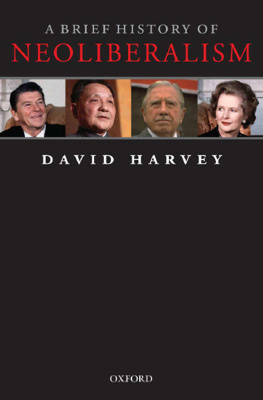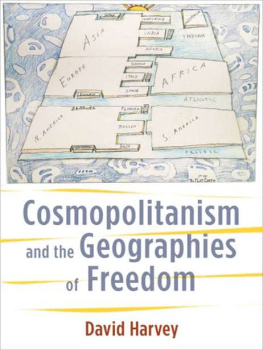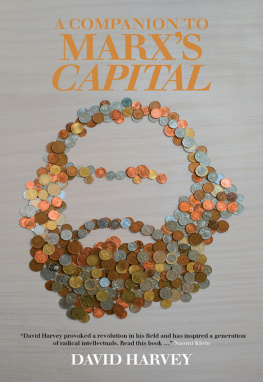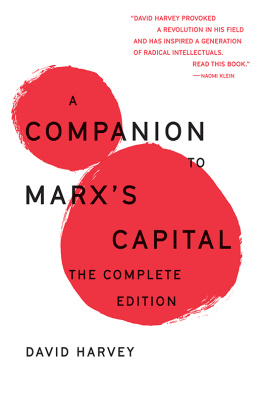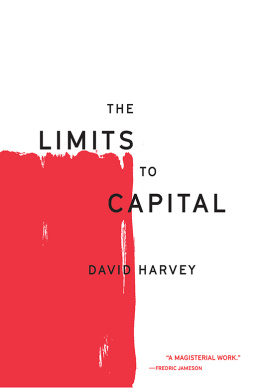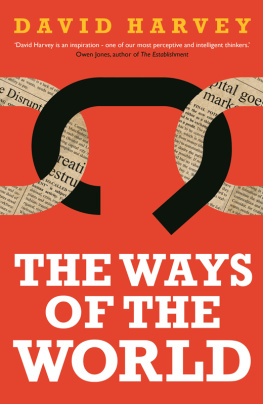David Harvey - A Companion to Marxs Grundrisse
Here you can read online David Harvey - A Companion to Marxs Grundrisse full text of the book (entire story) in english for free. Download pdf and epub, get meaning, cover and reviews about this ebook. publisher: Verso Books, genre: Romance novel. Description of the work, (preface) as well as reviews are available. Best literature library LitArk.com created for fans of good reading and offers a wide selection of genres:
Romance novel
Science fiction
Adventure
Detective
Science
History
Home and family
Prose
Art
Politics
Computer
Non-fiction
Religion
Business
Children
Humor
Choose a favorite category and find really read worthwhile books. Enjoy immersion in the world of imagination, feel the emotions of the characters or learn something new for yourself, make an fascinating discovery.
- Book:A Companion to Marxs Grundrisse
- Author:
- Publisher:Verso Books
- Genre:
- Rating:4 / 5
- Favourites:Add to favourites
- Your mark:
- 80
- 1
- 2
- 3
- 4
- 5
A Companion to Marxs Grundrisse: summary, description and annotation
We offer to read an annotation, description, summary or preface (depends on what the author of the book "A Companion to Marxs Grundrisse" wrote himself). If you haven't found the necessary information about the book — write in the comments, we will try to find it.
A Companion to Marxs Grundrisse — read online for free the complete book (whole text) full work
Below is the text of the book, divided by pages. System saving the place of the last page read, allows you to conveniently read the book "A Companion to Marxs Grundrisse" online for free, without having to search again every time where you left off. Put a bookmark, and you can go to the page where you finished reading at any time.
Font size:
Interval:
Bookmark:

A Companion to Marxs Grundrisse
A Companion to
Marxs Grundrisse
David Harvey

First published by Verso 2023
David Harvey 2023
All rights reserved
The moral rights of the author have been asserted
1 3 5 7 9 10 8 6 4 2
Verso
UK: 6 Meard Street, London W1F 0EG
US: 388 Atlantic Avenue, Brooklyn, NY 11217
versobooks.com
Verso is the imprint of New Left Books
ISBN-13: 978-1-80429-098-9
ISBN-13: 978-1-80429-099-6 (UK EBK)
ISBN-13: 978-1-80429-100-9 (US EBK)
British Library Cataloguing in Publication Data
A catalogue record for this book is available from the British Library
Library of Congress Cataloging-in-Publication Data
Names: Harvey, David, 1935- author.
Title: A companion to Marx's Grundrisse / David Harvey.
Description: London ; Brooklyn, NY : Verso, 2023. | Includes bibliographical references and index.
Identifiers: LCCN 2022036533 (print) | LCCN 2022036534 (ebook) | ISBN 9781804290989 (trade paperback) | ISBN 9781804291009 (ebook)
Subjects: LCSH: Marxian economics. | Capitalism.
Classification: LCC HB97.5 .H3538 2023 (print) | LCC HB97.5 (ebook) | DDC 335.4dc23/eng/20221011
LC record available at https://lccn.loc.gov/2022036533
LC ebook record available at https://lccn.loc.gov/2022036534
Typeset in Minion by Hewer Text UK Ltd, Edinburgh
Printed and bound by CPI Group (UK) Ltd, Croydon CR0 4YY
Contents
This Companion to Marxs Grundrisse is another contribution to what I call, in retrospect, The Marx Project. I say in retrospect because it is only when I look back that I can see that I have been engaged on this project over many years. It did not begin with a conscious purpose or design: it just grew. The impulse behind the project, which began some two decades ago, has, however, remained both clear and constant. I felt a pressing need to communicate, as clearly and simply as possible, what it was that Marx had uncovered in his critique of classical political economy. I also wanted to explore how the insights gained thereby could usefully illuminate the sources of the economic, social, ecological and political troubles and dangers that were becoming more and more salient across the globe. Marxs writings, I felt, were incisively relevant to understanding why capital not only was failing to meet human needs, but was also totally unable to stave off the dangers of environmental degradation. His works helped explain why capital was bound in the long run to fail on both counts.
Most people, when confronted with Marxs voluminous works on the critique of political economy, find them difficult, intimidating and confusing. As a result, there have arisen a variety of interpretations of his work by scholars and activists alike, coalescing in some instances into what appear to be factions or even whole schools of thought as to what the correct line is for elaborating on Marxs theoretical contributions. Political parties of the left (particularly of a communist persuasion) have often shaped distinctive but somewhat rigid interpretations suited to their political situation and agendas. Marx, being the controversial figure that he is, has also attracted his share of personal vilification from opponents. Deliberate misrepresentations and false representations abound, along with more sophisticated and subtle attempts to undermine his views. All of this creates expectations and a climate of presumption and prejudgment that makes a simple and uncluttered reading of any of his texts virtually impossible.
My aim was and is to open a door into Marxs thinking and to encourage as many people as possible to pass through it and take a closer look at the texts and make of them what they will. I have no interest in trying to impose my own particular interpretations on anyone. That is why I call my books on Marx companions rather than guides. I cannot, of course, open a path to an understanding of Marxs thought without using my own experience and interests as crucial helpmates for interpretation. The fact that my main interest has been urbanization and uneven geographical development, at a variety of scales, clearly affects the way I evaluate Marxs texts. I imagine myself, however, accompanying the reader on a long hike in which I point out this and that particular feature here and there, drawing upon my long experience of working with the text, and highlight moments of epiphany for me, linking ideas together, when possible, while always wondering and asking what it is that you, the reader, might make of it all. In teaching Marx over the last fifty years, I have been incredibly fortunate to teach it to all sorts of different groups and audiences. I have learned immensely from the very divergent ways in which people can make sense of what Marx is saying. This is, of course, a tribute to the rich complexity of the texts; that they can speak so directly to so many different people living in such radically different situations and coming from such radically different cultural and intellectual traditions.
The Grundrisse is, by far, the most interesting and the most difficult book by Marx to work with. It is a set of notes that Marx was frantically writing to himself at a rather frantic time. Marx, throughout his lifetime, employed different modes of writing depending upon his audience. These can be categorized into four types. There was, first, the writing style adopted in his journalism, in his contemporary commentaries and in his correspondence. It is plainspoken and colloquial, even as it takes on difficult matters with some conceptual grace. Some of his serious writings on political economy were prepared for publication, such as Volume I of Capital. There, he is greatly concerned to use a language which he thinks his audience will understand. That audience was the literate fraction of a working class, the majority of whom were illiterate. The literate fraction was self-taught, quite sophisticated and, being autodidacts, unlikely to be subject to the disciplinary tropes of formal education. So, while Capital may appear to us as a difficult book, somewhat above the capacity of the average undergraduate in formal education to easily comprehend, this would not necessarily be true for the autodidact artisans that Marx was concerned to influence, primarily in Britain and France but also in the United States and beyond. My own hope in my Marx Project has been to recast Marxs language in a way more accessible to contemporary student audiences along with the autodidacts (yes, they still exist) in the labor unions and social movements. The third kind of writing is more experimental. It is constructed as a voyage of discovery, where Marx will unfold an argument, sometimes deploying novel and even arcane concepts for anyone willing to follow. This is characteristic of the manuscripts out of which Engels constructed both Volumes II and III of Capital. The fourth kind of writing is Marx writing purely for himself, using whatever tools and ideas that he has in his head, prepared to unleash a stream of his own consciousness, to set down possibilities and potential interrelations that may or may not turn out to be important in his more considered studies. This last is the predominant style of the Grundrisse, and it is this that makes it such an exciting, frustrating, imaginative and sometimes boringly repetitive text to work with. Marx is, in short, just talking to himself. It is not sufficient to understand his language (which is distinctly his own). It is also important to understand his mode of thinking, which is, to put it mildly, somewhat elusive. But this is the form of writing that dominates in the
Font size:
Interval:
Bookmark:
Similar books «A Companion to Marxs Grundrisse»
Look at similar books to A Companion to Marxs Grundrisse. We have selected literature similar in name and meaning in the hope of providing readers with more options to find new, interesting, not yet read works.
Discussion, reviews of the book A Companion to Marxs Grundrisse and just readers' own opinions. Leave your comments, write what you think about the work, its meaning or the main characters. Specify what exactly you liked and what you didn't like, and why you think so.


